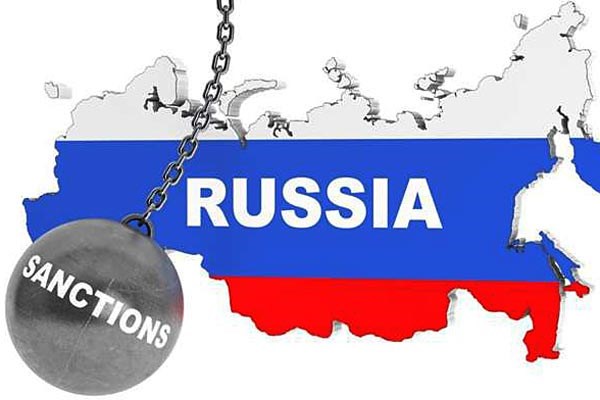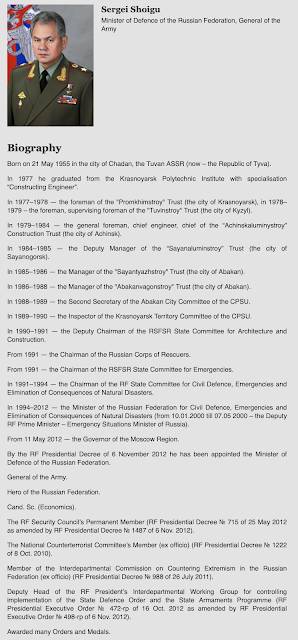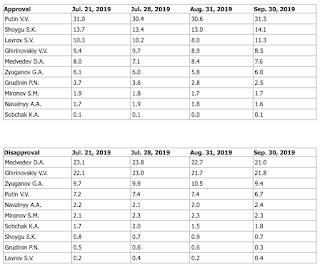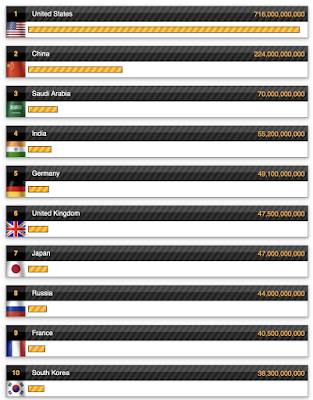
Those of us who live in the West rarely hear accurate and thorough reporting about how Russia and its leadership view us. A recent English language interview with Russia's Minister of Defense and General of the Army, Sergei Soigu, which was published on the Russian media outlet Moskovkij Komsomolets, was the first details interview that Shoigu has given in seven years. In this interview, he looks at the rebuilding of the Russian armed forces after the outbreak of the Russo-Georgian War in 2008. At that time, it was decided that it was necessary to finance and implement a new state armament program to modernize Russia's armed forces with modern equipment and weaponry, a program that would allow the Russian army to be in a state of constant readiness.
As background, Sergei Shoigu was appointed Russia's Minister of Defense in November 2012 after serving his nation for many years as shown on this screen capture from his official English language biography:
Recent press coverage by The Times suggests that it is quite possible that Mr. Shoigu could be the successor to Vladimir Putin when Putin's term as Russian president runs out in 2024:
According to the Russian Public Opinion Research Center (VCIOM) Mr. Shoigu has the second highest approval rating among major Russian politicians (after Vladimir Putin) and the third lowest disapproval rating as shown here:
With that background, let's look at what Defense Minister Shoigu had to say in response to some key questions about the possibility of war and the American military-industrial complex noting that all bolds are mine:
1.) Question: "How likely is Russia's participation in any full-scale armed conflict in the near future? And what strategic threats do you assess as posing the greatest danger for Russia in the near future?"
Shoigu: "The question you've asked is not a simple one. Perhaps it is unsuitable for an interview like ours. But I'll try to answer it. I hope that there is no possibility of a full-scale war today. And all the risks and consequences that such a full-scale war entails are obvious to everyone. Regarding the third world war, there are a very large number of most differing statements.
The most accurate and adequate of them seems to me the following: 'I don't know what kind the third world war will be. But I know for sure that it will be the last one'. However, if we talk about the number of threats to our country, then they do not diminish. The United States has already withdrawn from two important nuclear arms control treaties. So far, the START-3 treaty remains, which is also under discussion in the US, whether to renew it or not? As a result of this approach, the world is becoming more unpredictable and less secure. At the current level of computerization and automation, there is a high probability of errors in the weapons control system.
That is why issues of ensuring information security have come to the fore. When you are aware of your vulnerability and interested in maintaining balance and universal security parity, it makes you think. And when you think that a balance of power has developed in your favor [this is how the United States continues to believe by inertia], a variety of ideas may pop into your head, including not the most reasonable ones. It is in this situation that I see the main threat, and not only for Russia."
2.) Question: "That is, from your point of view, we are lucky that the West very early on revealed its true, far from (benign) intentions?"
Shoigu: "We were lucky in that we still managed to stop in time. The process of returning to common sense, as I said, began in 1999. Starting from that moment, by putting in a lot of effort we have achieved that the world today has ceased to be unipolar. And this, of course, very much displeases the West that is making every effort to restore to itself a monopoly on global influence. Someone believes that the open large-scale opposition of the West to Russia began only five years ago – starting with Ukraine and the Crimea events. But this is a mistake. We can recommend a detailed recollection of what exactly happened in the 90s, in 2008, 2013.
What nonsense was not written and said about us at a time when we were preparing for the Olympic Games in Sochi! And this went well beyond an information war.
I do not want to dig deep. But the meaning of what is happening, from my point of view, is as follows: patterns and algorithms for overthrowing any legal authority in any country inconvenient for the West, have long been created. Of course, all this is done under the banner of promoting democracy. Well, in which country where they 'came with democracy' did this democracy take root: in Iraq, Afghanistan or Libya? Or [did it happen] in the former Yugoslavia, which they forcibly divided into 6 countries with their 'democratic' bombing in 1999? And you can simply forget about sovereignty and independence after any American intervention. And does it surprising to anyone that in Libya the majority of oil deposits belong to American or US-controlled companies?
Our Western colleagues like to accuse Russia of waging some kind of 'hybrid wars'. But I must say that it is the West itself that is waging real hybrid wars. Now, for example, leaving Afghanistan in a dilapidated state, the Americans are diligently making a fuss in Venezuela – also, of course, for the sake of ' democracy's triumph'!"
3.) Question: "The US military budget is ten times greater than the Russian one. Can Russia, in principle, effectively confront America under such conditions?"
Shoigu: "Our Supreme Commander-in-Chief has already answered this question thoroughly and reasonably. Not only can it [resist] – Russia is already opposing America quite effectively. It resists thanks to our science, our industry and our innovative developments. And besides this, we are not trying to compete with them on all fronts. If you were to spread out the US military budget on the shelves, you will reach an understanding: they have huge expenses for various bases scattered all over the world. America has 170 such bases. American expenditures on the same operation in Afghanistan alone are almost equal to our annual defense budget. Gigantic money is being spent by the United States on private military companies, on aircraft carrier groups. But does Russia really need five or ten aircraft carrier groups, if we are not going to attack anyone? We need funds that could potentially be used against such enemy carrier groups in case of aggression against our country. And this is incomparably cheaper and more effective!
I have given you only a few separate facts. But bearing them in mind, it becomes clear that we do not need to compare our defense budget with the Americans. By defense budget size, we are even only in seventh place globally. Saudi Arabia and, incidentally, Japan are ahead of us in this indicator. The main thing is that we are quite effective in our military expenditures, which are very precisely spent and are closely monitored by our Supreme Commander."
Oh that Washington could say the same thing about the effectiveness of its military expenditures!
Here is a graphic from Global Firepower showing the top ten defense spenders:
In 2018, overall global military expenditures hit a total of $1.82 percent with sixty percent of that coming from five nations; the United States, China, Saudi Arabia, India and France.
The comments from current Russian Minister of Defense are most interesting, particularly given the possibility that he could replace current Russian President Vladimir Putin. At that point, his views on war and the Russian military will become more than just his personal opinion, they will become the uncomfortable reality for our new multipolar geopolitical reality.
Click HERE to read more from this author.
You can publish this article on your website as long as you provide a link back to this page.





Be the first to comment